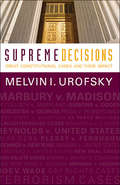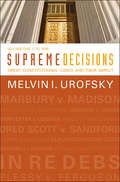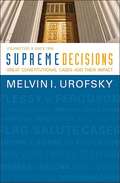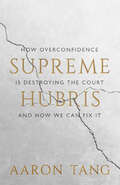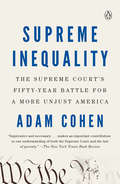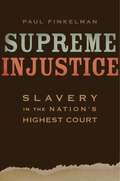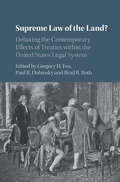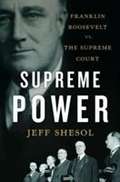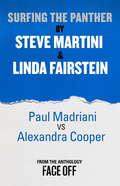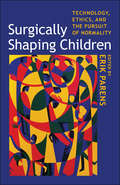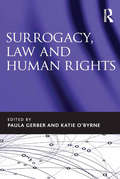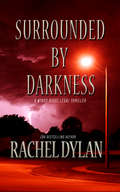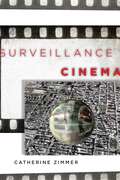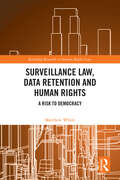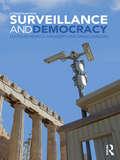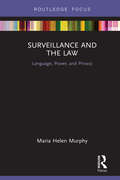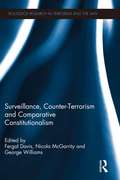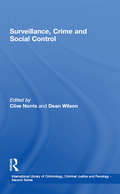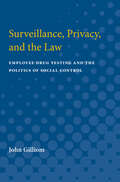- Table View
- List View
Supreme Decisions, Combined Volume
by Melvin I. UrofskySupreme Decisions: Great Constitutional Cases and Their Impact covers twenty-three Supreme Court cases that have shaped American constitutional law. Interpretive chapters shed light on the nuances of each case, the individuals involved, and the social, political, and cultural context at that particular moment in history. Discussing cases from nearly every decade in a two-hundred-year span, Melvin I. Urofsky expounds on the political climate of the United States from the country's infancy through the new millennium. Featuring Marbury v. Madison, Dred Scott v. Sandford, Miranda v. Arizona, Brown v. Board of Education, and many more, this text covers foundational rulings and more recent decisions. Written with students in mind, Melvin I. Urofsky's voice offers compelling and fascinating accounts of American legal milestones.Supreme Decisions can be purchased as a single combined volume or conveniently split into two volumes, providing a breadth of information for survey courses in U.S. Constitutional History.
Supreme Decisions, Combined Volume
by Melvin I. UrofskySupreme Decisions: Great Constitutional Cases and Their Impact, Volumes 1 and 2, covers twenty-four Supreme Court cases (twelve per volume) that have shaped American constitutional law. Interpretive chapters shed light on the nuances of each case, the individuals involved, and the social, political, and cultural context at that particular moment in history. Discussing cases from nearly every decade in a two-hundred-year span, Melvin I. Urofsky expounds on the political climate of the United States from the country's infancy through the new millennium. Featuring Marbury v. Madison, Dred Scott v. Sandford, Miranda v. Arizona, Brown v. Board of Education, and many more, this text covers foundational rulings and more recent decisions. Written with students in mind, Melvin I. Urofsky's voice offers compelling and fascinating accounts of American legal milestones. Supreme Decisions can be purchased as a single combined volume or conveniently split into two volumes, providing a breadth of information for survey courses in U. S. Constitutional History.
Supreme Decisions, Volume 1
by Melvin I. UrofskySupreme Decisions: Great Constitutional Cases and Their Impact, Volumes 1 and 2, covers twenty-four Supreme Court cases (twelve per volume) that have shaped American constitutional law. Interpretive chapters shed light on the nuances of each case, the individuals involved, and the social, political, and cultural context at that particular moment in history. Discussing cases from nearly every decade in a two-hundred-year span, Melvin I. Urofsky expounds on the political climate of the United States from the country's infancy through the new millennium. Featuring Marbury v. Madison, Dred Scott v. Sandford, Miranda v. Arizona, Brown v. Board of Education, and many more, this text covers foundational rulings and more recent decisions. Written with students in mind, Melvin I. Urofsky's voice offers compelling and fascinating accounts of American legal milestones. Supreme Decisions can be purchased as a single combined volume or conveniently split into two volumes, providing a breadth of information for survey courses in U. S. Constitutional History.
Supreme Decisions, Volume 1
by Melvin I. UrofskySupreme Decisions: Great Constitutional Cases and Their Impact, Volumes 1 and 2, covers twenty-four Supreme Court cases (twelve per volume) that have shaped American constitutional law. Interpretive chapters shed light on the nuances of each case, the individuals involved, and the social, political, and cultural context at that particular moment in history. Discussing cases from nearly every decade in a two-hundred-year span, Melvin I. Urofsky expounds on the political climate of the United States from the country's infancy through the new millennium. Featuring Marbury v. Madison, Dred Scott v. Sandford, Miranda v. Arizona, Brown v. Board of Education, and many more, this text covers foundational rulings and more recent decisions. Written with students in mind, Melvin I. Urofsky's voice offers compelling and fascinating accounts of American legal milestones.Supreme Decisions can be purchased as a single combined volume or conveniently split into two volumes, providing a breadth of information for survey courses in U.S. Constitutional History.
Supreme Decisions, Volume 1: Great Constitutional Cases and Their Impact
by Melvin I. UrofskySupreme Decisions: Great Constitutional Cases and Their Impact covers twenty-three Supreme Court cases that have shaped American constitutional law. Interpretive chapters shed light on the nuances of each case, the individuals involved, and the social, political, and cultural context at that particular moment in history. Discussing cases from nearly every decade in a two-hundred-year span, Melvin I. Urofsky expounds on the political climate of the United States from the country’s infancy through the new millennium. Featuring Marbury v. Madison, Dred Scott v. Sandford, Miranda v. Arizona, Brown v. Board of Education, and many more, this text covers foundational rulings and more recent decisions. Written with students in mind, Melvin I. Urofsky’s voice offers compelling and fascinating accounts of American legal milestones.
Supreme Decisions, Volume 2
by Melvin I. UrofskySupreme Decisions: Great Constitutional Cases and Their Impact, Volumes 1 and 2, covers twenty-four Supreme Court cases (twelve per volume) that have shaped American constitutional law. Interpretive chapters shed light on the nuances of each case, the individuals involved, and the social, political, and cultural context at that particular moment in history. Discussing cases from nearly every decade in a two-hundred-year span, Melvin I. Urofsky expounds on the political climate of the United States from the country's infancy through the new millennium. Featuring Marbury v. Madison, Dred Scott v. Sandford, Miranda v. Arizona, Brown v. Board of Education, and many more, this text covers foundational rulings and more recent decisions. Written with students in mind, Melvin I. Urofsky's voice offers compelling and fascinating accounts of American legal milestones.Supreme Decisions can be purchased as a single combined volume or conveniently split into two volumes, providing a breadth of information for survey courses in U.S. Constitutional History.
Supreme Decisions, Volume 2
by Melvin I. UrofskySupreme Decisions: Great Constitutional Cases and Their Impact, Volumes 1 and 2, covers twenty-four Supreme Court cases (twelve per volume) that have shaped American constitutional law. Interpretive chapters shed light on the nuances of each case, the individuals involved, and the social, political, and cultural context at that particular moment in history. Discussing cases from nearly every decade in a two-hundred-year span, Melvin I. Urofsky expounds on the political climate of the United States from the country's infancy through the new millennium. Featuring Marbury v. Madison, Dred Scott v. Sandford, Miranda v. Arizona, Brown v. Board of Education, and many more, this text covers foundational rulings and more recent decisions. Written with students in mind, Melvin I. Urofsky's voice offers compelling and fascinating accounts of American legal milestones. Supreme Decisions can be purchased as a single combined volume or conveniently split into two volumes, providing a breadth of information for survey courses in U. S. Constitutional History.
Supreme Decisions, Volume 2: Great Constitutional Cases and Their Impact
by Melvin I. UrofskySupreme Decisions: Great Constitutional Cases and Their Impact covers twenty-three Supreme Court cases that have shaped American constitutional law. Interpretive chapters shed light on the nuances of each case, the individuals involved, and the social, political, and cultural context at that particular moment in history. Discussing cases from nearly every decade in a two-hundred-year span, Melvin I. Urofsky expounds on the political climate of the United States from the country’s infancy through the new millennium. Featuring Marbury v. Madison, Dred Scott v. Sandford, Miranda v. Arizona, Brown v. Board of Education, and many more, this text covers foundational rulings and more recent decisions. Written with students in mind, Melvin I. Urofsky’s voice offers compelling and fascinating accounts of American legal milestones.
Supreme Hubris: How Overconfidence Is Destroying the Court—and How We Can Fix It
by Aaron TangHow to repair the dysfunction at the Supreme Court in a way that cuts across partisan ideologies The Supreme Court, once the most respected institution in American government, is now routinely criticized for rendering decisions based on the individual justices’ partisan leanings rather than on a faithful reading of the law. For legal scholar Aaron Tang, however, partisanship is not the Court’s root problem. Overconfidence is. Conservative and liberal justices alike have adopted a tone of uncompromising certainty in their ability to solve society’s problems with just the right lawyerly arguments. The result is a Court that lurches stridently from one case to the next, delegitimizing opposing views and undermining public confidence in itself. To restore the Court’s legitimacy, Tang proposes a different approach to hard cases: one in which the Court acknowledges the arguments and interests on both sides and rules in the way that will do the least harm possible. Examining a surprising number of popular opinions where the Court has applied this approach—ranging from LGBTQ rights to immigration to juvenile justice—Tang shows how the least harm principle can provide a promising and legally grounded framework for the difficult cases that divide our nation.
Supreme Inequality: The Supreme Court's Fifty-Year Battle for a More Unjust America
by Adam CohenA New York Times "20 Books We're Watching For in 2020" pickFrom New York Times bestselling author Adam Cohen, a revelatory examination of the conservative direction of the Supreme Court over the last fifty years since the Nixon administrationIn 1969, newly elected president Richard Nixon launched an assault on the Supreme Court. He appointed four conservative justices in just three years, dismantling its previous liberal majority and setting it on a rightward course that continues to today. Before this drastic upheaval, the Court, led by Chief Justice Earl Warren, had been a powerful force for equality and inclusion, expanding the rights of the poor and racial minorities. Its rulings integrated schools across the South, established the Miranda warning for suspects in police custody, and recognized the principle of one person, one vote. But when Warren retired, Nixon used his four nominations to put a stop to that liberal agenda, and turn the Court into a force for his own views about what kind of nation America should be. In Supreme Inequality, bestselling author Adam Cohen surveys the most significant Supreme Court rulings since the Nixon era and exposes how rarely the Court has veered away from its agenda of promoting inequality. Contrary to what Americans like to believe, the Court does little to protect the rights of the poor and disadvantaged; in fact, it has not been on their side for fifty years. Many of the greatest successes of the Warren Court, in areas such as school desegregation, voting rights, and protecting workers, have been abandoned in favor of rulings that protect corporations and privileged Americans, who tend to be white, wealthy, and powerful. As the nation comes to grips with two new Trump-appointed justices, Cohen proves beyond doubt that the modern Court has been one of the leading forces behind the nation's soaring level of economic inequality, and that an institution revered as a source of fairness has been systematically making America less fair. A triumph of American legal, political, and social history, Supreme Inequality holds to account the highest court in the land, and shows how much damage it has done to America's ideals of equality, democracy, and justice for all.
Supreme Injustice: Slavery in the Nation’s Highest Court (The Nathan I. Huggins lectures #17)
by Paul FinkelmanIn ruling after ruling, the three most important pre–Civil War justices—Marshall, Taney, and Story—upheld slavery. Paul Finkelman establishes an authoritative account of each justice’s proslavery position, the reasoning behind his opposition to black freedom, and the personal incentives that embedded racism ever deeper in American civic life.
Supreme Law of the Land?: Debating the Contemporary Effects of Treaties within the United States Legal System
by Fox Roth Paul R. Gregory H. Dubinsky Brad R.How do treaties function in the American legal system? This book provides a comprehensive analysis of the current status of treaties in American law. Its ten chapters examine major areas of change in treaty law in recent decades, including treaty interpretation, federalism, self-execution, treaty implementing legislation, treaty form, and judicial barriers to treaty enforcement. The book also includes two in-depth case studies: one on the effectiveness of treaties in the regulation of armed conflict and one on the role of a resurgent federalism in complicating US efforts to ratify and implement treaties in private international law. Each chapter asks whether the treaty rules of the 1987 Third Restatement of Foreign Relations Law accurately reflect today's judicial, executive, and legislative practices. This volume is original and provocative, a useful desk companion for judges and practicing lawyers, and an engaging read for the general reader and graduate students.
Supreme Power: Franklin Roosevelt vs. the Supreme Court
by Jeff ShesolDuring Franklin Roosevelt's first term, a narrow conservative majority on the US Supreme Court struck down several key elements of the New Deal legislation. The ensuing fight engulfed the country. Providing new evidence and fresh insight, Jeff Shesol unfolds like a thriller, with vivid characters and unexpected twists, why understanding the Court fight is essential to understanding the presidency, personality, and legacy of FDR-and to understanding America at a crossroads in its history.
Surfing the Panther: An Original Short Story
by Steve Martini Linda FairsteinIn this short story from the New York Times bestselling thriller anthology Face Off, Linda Fairstein and Steve Martini - along with their popular series characters Alex Cooper and Paul Madriani - team up for the first time ever. Paired together on a legal conference panel, Assistant Manhattan D.A. Alexandra Cooper and Los Angeles criminal defense attorney Paul Madriani butt heads over a hypothetical case. But Madriani - currently representing a defendant in the suspected murder of an L.A.-area madam - runs afoul of Coop within minutes over the issue of empathy for the victim, real or hypothetical. Still, after the panel there are no hard feelings and the two colleagues plan to enjoy a drink at one of Coop's favourite New York City watering holes - that is, until they are approached by an audience member claiming to know something about Madriani's real-life case that will exonerate his client. Cooper and Madriani's meeting with the source will lead them into the thick of a global conspiracy that reaches to the highest echelons of power - and ultimately, justice will be done. For more exciting short story pairings, don't miss all eleven short stories in Face Off!
Surgically Shaping Children: Technology, Ethics, and the Pursuit of Normality
by Erik ParsensWinner of an Honorable Mention in the Clinical Medicine category of the Professional and Scholarly Publishing Awards given by the Association of American PublishersAt a time when medical technologies make it ever easier to enhance our minds and bodies, a debate has arisen about whether such efforts promote a process of "normalization," which makes it ever harder to tolerate the natural anatomical differences among us. The debate becomes especially complicated when it addresses the surgical alteration, or "shaping," of children. This volume explores the ethical and social issues raised by the recent proliferation of surgeries designed to make children born with physical differences look more normal.Using three cases—surgeries to eliminate craniofacial abnormalities such as cleft lip and palate, surgeries to correct ambiguous genitalia, and surgeries to lengthen the limbs of children born with dwarfism—the contributors consider the tensions parents experience when making such life-altering decisions on behalf of or with their children.The essays in this volume offer in-depth examinations of the significance and limits of surgical alteration through personal narratives, theoretical reflections, and concrete suggestions about how to improve the decision-making process. Written from the perspectives of affected children and their parents, health care providers, and leading scholars in philosophy, sociology, history, law, and medicine, this collection provides an integrated and comprehensive foundation from which to consider a complex and controversial issue. It takes the reader on a journey from reflections on the particulars of current medical practices to reflections on one of the deepest and most complex of human desires: the desire for normality.ContributorsPriscilla Alderson, Adrienne Asch, Cassandra Aspinall, Alice Domurat Dreger, James C. Edwards, Todd C. Edwards, Ellen K. Feder, Arthur W. Frank, Lisa Abelow Hedley, Eva Fedder Kittay, Hilde Lindemann, Jeffery L. Marsh, Paul Steven Miller, Sherri G. Morris, Wendy E. Mouradian, Donald L. Patrick, Nichola Rumsey, Emily Sullivan Sanford, Tari D. Topolski
Surrogacy, Law and Human Rights
by Paula Gerber Katie O'ByrneSurrogacy presents particularly complex questions for human rights law and theory. This book provides a unique and insightful examination into the underexplored issues of how domestic and international law is responding to the sharp increase in the use of surrogacy. The work presents critical analysis of the current regulation of surrogacy via domestic law in Australia, India and the USA, and international law in the form of the UN Convention on the Rights of the Child. Including a wide range of views from academics and practitioners around the world, the contributors consider what could be done to further protect the rights of all persons involved in surrogacy arrangements. This in-depth study of the international and domestic law governing surrogacy provides much needed scholarly knowledge of this contemporary phenomenon, along with recommendations for improvement, regulation and reform. The book will be of great importance to human rights and legal scholars, and well as practitioners in this field.
Surrounded by Darkness (Windy Ridge Legal Thriller #3)
by Rachel DylanWhen attorney Olivia Murray opens a legal clinic for victims of domestic violence in Windy Ridge, she knows she will face legal and spiritual opposition. The New Age presence has grown stronger as alliances form between groups hoping to spread their destructive way of life and gain a stronghold in the community. While the forces of evil target Olivia’s new clinic and her relationships, she refuses to let them stop her quest for justice.Grant Baxter is facing legal woes of his own when a former client sues him for malpractice. His faith is shaken as he faces down the possibility that his legal career is over. While Grant struggles to save his once thriving law practice, he wonders if he truly deserves to be Olivia’s partner outside of the courtroom.With evil coming at them from all angles, Olivia and Grant’s relationship is put to the test. The two of them must come together and fight for the hearts and minds of those in Windy Ridge. Will their faith be strong enough—in God and each other—to prevail in the battle that threatens to bring darkness to the entire town?
Surveillance Cinema (Postmillennial Pop #2)
by Catherine ZimmerIn Paris, a static video camera keeps watch on a bourgeois home. In Portland, a webcam documents the torture and murder of kidnap victims. And in clandestine intelligence offices around the world, satellite technologies relentlessly pursue the targets of global conspiracies. Such plots represent only a fraction of the surveillance narratives that have become commonplace in recent cinema. Catherine Zimmer examines how technology and ideology have come together in cinematic form to play a functional role in the politics of surveillance. Drawing on the growing field of surveillance studies and the politics of contemporary monitoring practices, she demonstrates that screen narrative has served to organize political, racial, affective, and even material formations around and through surveillance. She considers how popular culture forms are intertwined with the current political landscape in which the imagery of anxiety, suspicion, war, and torture has become part of daily life. From Enemy of the State and The Bourne Series to Saw, Caché and Zero Dark Thirty, Surveillance Cinema explores in detail the narrative tropes and stylistic practices that characterize contemporary films and television series about surveillance.
Surveillance Law, Data Retention and Human Rights: A Risk to Democracy (Routledge Research in Human Rights Law)
by Matthew WhiteThis book analyses the compatibility of data retention in the UK with the European Convention on Human Rights (ECHR). The increase in the use of modern technology has led to an explosion of generated data and, with that, a greater interest from law enforcement and intelligence agencies. In the early 2000s, data retention laws were introduced into the UK, and across the European Union (EU). This was met by domestic challenges before national courts, until a seminal ruling by the Court of Justice in the European Union (CJEU) ruled that indiscriminate data retention was incompatible with EU law. Since then, however, the CJEU has revised its position and made certain concessions, particularly under the guise of national security. This book focuses on data retention in the UK with the principal aim of examining compatibility with the ECHR. This is explored through a variety of ways including providing an account of democracy and why secret surveillance poses a threat to it, a history of data retention, assessing the seriousness that data retention poses to fundamental rights, the collection of rights that are affected by data retention which are crucial for a functioning democracy, the implications of who can be obligated to retain (and what to retain), the idea that data retention is a form of surveillance and ultimately, with all things considered, whether this is compatible with the ECHR. The work will be an invaluable resource for students, academics, researchers and policy-makers working in the areas of privacy, human rights law and surveillance.
Surveillance and Democracy
by Kevin D. HaggertyThis collection represents the first sustained attempt to grapple with the complex and often paradoxical relationships between surveillance and democracy. Is surveillance a barrier to democratic processes, or might it be a necessary component of democracy? How has the legacy of post 9/11 surveillance developments shaped democratic processes? As surveillance measures are increasingly justified in terms of national security, is there the prospect that a shadow "security state" will emerge? How might new surveillance measures alter the conceptions of citizens and citizenship which are at the heart of democracy? How might new communication and surveillance systems extend (or limit) the prospects for meaningful public activism? Surveillance has become central to human organizational and epistemological endeavours and is a cornerstone of governmental practices in assorted institutional realms. This social transformation towards expanded, intensified and integrated surveillance has produced many consequences. It has also given rise to an increased anxiety about the implications of surveillance for democratic processes; thus raising a series of questions – about what surveillance means, and might mean, for civil liberties, political processes, public discourse, state coercion and public consent – that the leading surveillance scholars gathered here address.
Surveillance and the Law: Language, Power and Privacy
by Maria Helen MurphySurveillance of citizens is a clear manifestation of government power. The act of surveillance is generally deemed acceptable in a democratic society where it is necessary to protect the interests of the nation and where the power is exercised non-arbitrarily and in accordance with the law. Surveillance and the Law analyses the core features of surveillance that create stark challenges for transparency and accountability by examining the relationship between language, power, and surveillance. It identifies a number of features of surveillance law, surveillance language, and the distribution of power that perpetuate the existing surveillance paradigm. Using case studies from the US, the UK, and Ireland, it assesses the techniques used to maintain the status quo of continued surveillance expansion. These jurisdictions are selected for their similarities, but also for their key constitutional distinctions, which influence how power is distributed and restrained in the different systems. Though the book maintains that the classic principles of transparency and accountability remain the best means available to limit the arbitrary exercise of government power, it evaluates how these principles could be better realised in order to restore power to the people and to maintain an appropriate balance between government intrusion and the right to privacy. By identifying the common tactics used in the expansion of surveillance around the globe, this book will appeal to students and scholars interested in privacy law, human rights, information technology law, and surveillance studies.
Surveillance, Counter-Terrorism and Comparative Constitutionalism (Routledge Research in Terrorism and the Law)
by George Williams Nicola McGarrity Fergal DavisThe decade after 11 September 2001 saw the enactment of counter-terrorism laws around the world. These laws challenged assumptions about public institutions, human rights and constitutional law. Those challenges are particularly apparent in the context of the increased surveillance powers granted to many law enforcement and intelligence agencies. This book brings together leading legal scholars in the field of counter-terrorism and constitutional law, and focuses their attention on the issue of surveillance. The breadth of topics covered in this collection include: the growth and diversification of mechanisms of mass surveillance, the challenges that technological developments pose for constitutionalism, new actors in the surveillance state (such as local communities and private organisations), the use of surveillance material as evidence in court, and the effectiveness of constitutional and other forms of review of surveillance powers. The book brings a strong legal focus to the debate surrounding surveillance and counter-terrorism, and draws important conclusions about the constitutional implications of the expansion of surveillance powers after 9/11.
Surveillance, Crime and Social Control (International Library of Criminology, Criminal Justice and Penology - Second Series #Vol. 2)
by Clive Norris and Dean WilsonPost 9/11 the need for an expansion of surveillance and greater expenditure on surveillance capabilities has been argued for by government and industry to help combat terrorism. This has been coupled with increasing incorporation of surveillance technologies into the routine practice of criminal justice. This important collection draws together key contemporary writings to explore how the surveillance gaze has been directed in the name of crime control. Key issues include theories on surveillance, CCTV, undercover police surveillance, bodies databases and technologies, and surveillance futures. It will be an essential collection for law librarians and criminologists.
Surveillance, Privacy, and the Law: Employee Drug Testing and the Politics of Social Control (Law, Meaning, And Violence)
by John GilliomEmployee drug testing is an invasive and controversial new social control policy that burst into the American work place during the war on drugs of the 1980s. Workers, judges, and politicians divided over whether it was an unnecessary and unconstitutional program of surveillance or an effective and appropriate new weapon in the anti-drug arsenal. When the dust had settled, the new technique was widely used and had been strongly approved by the United States Supreme Court. This raises the fundamental question: Why was the momentum behind testing so strong and the opposition to testing so ineffective? Drawing on theories of ideological hegemony and legal mobilization, John Gilliom begins the search for answers with an examination of how the imagery of a national drug crisis served as the legitimating context for the introduction of testing. Surveillance, Privacy, and the Law then moves beyond the specific history of testing and frames the new policy within a broader transformation of social control policy seen by students of political economy, society, and culture. The book cites survey research among skilled workers and analyzes court opinions to highlight the sharply polarized opinions in the workplaces and courthouses of America. Although federal court decisions show massive and impassioned disagreement among judges, the new conservative Supreme Court comes down squarely behind testing. Its ruling embraces surveillance technology, rejects arguments against testing, and undermines future opposition to policies of general surveillance. Surveillance, Privacy, and the Law portrays the apparent triumph of testing policies as a victory for the conservative law-and-order movement and a stark loss for the values of privacy and autonomy. As one episode in a broader move toward a surveillance society, the battle over employee drug testing raises disturbing questions about future struggles over revolutionary new means of surveillance and control. John Gilliom is Professor of Political Science, Ohio University.
